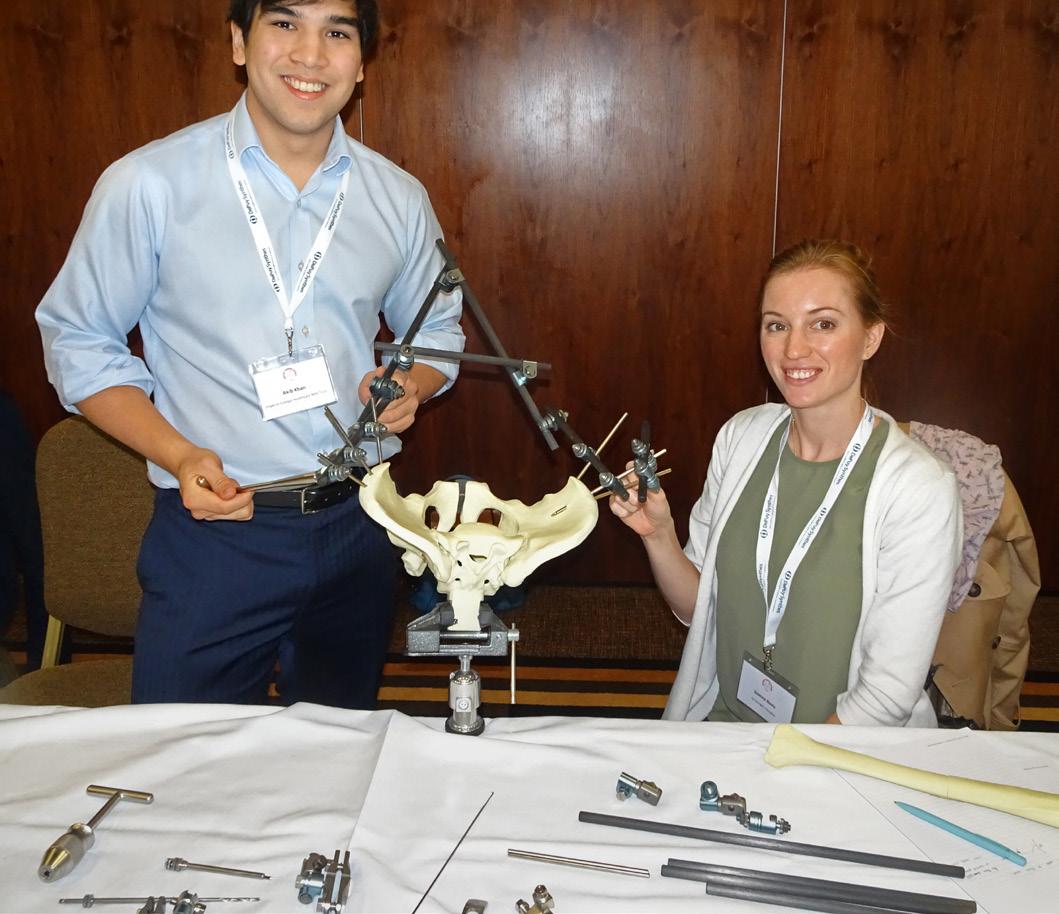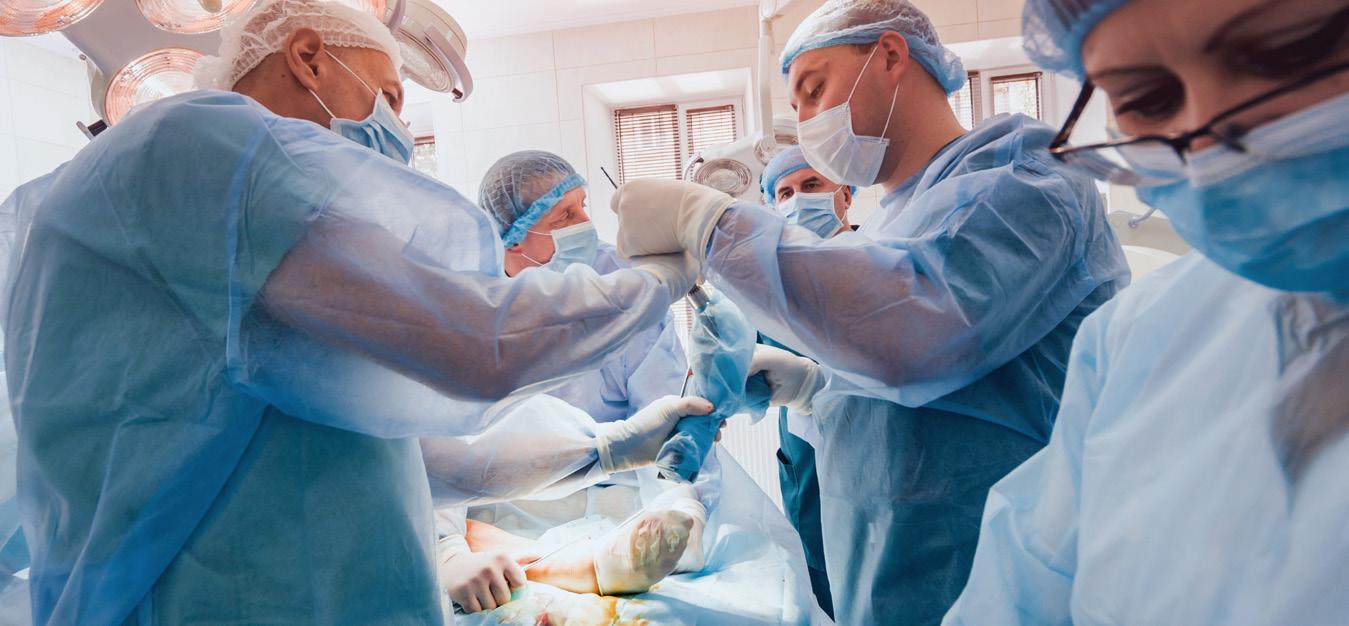
11 minute read
News: Specialist Society Updates
British Trauma Society (BTS) update
Hurry get your diaries out and make a note: our annual scientific meeting is planned for Oxford, 24th – 25th November 2021. There will shortly be a call for abstracts – please see our website www.bts-org.co.uk and follow us on twitter @britishtrauma for more information.
Advertisement
We have an exciting provisional programme that will appeal. We aim to make it an unforgettable event so please come and join us and together we will put behind our difficult year.
We are a multi-disciplinary society, involving all those in the care of the injured patient. We aim to create standards for certain categories of polytrauma patients in collaboration with other specialties, ranging from obstetrics to ophthalmology, culminating in ‘go to’ documents.
Inspired by Dr Chris Turner’s insightful keynote speech at our 2019 conference on how ‘civility saves lives’ we have been thinking more about how behaviour can affect outcomes in trauma and how we can reduce the risk of medical error (especially during the current climate). We hope to run our Human Factors Conference at the Queen Elizabeth Hospital, Birmingham, at a safer time – provisionally planned for 21st June, 2021.
Several regional external fixator courses are being planned throughout the year aiming to cover principles of external fixation and their application in long bone and pelvic injuries. These courses are aimed at all grades of surgeons with particular emphasis on ‘hands on’ practicals. Previous courses have been well received by attendees and are ideal for revalidation in trauma.
We strive to be adaptable in order to deliver the best learning opportunities possible during the COVID-19 pandemic. Let us hope that we can meet, greet, socialise, and exchange ideas at our events in 2021!
British Orthopaedic Foot and Ankle Society (BOFAS) update
James Davis

The British Orthopaedic Foot and Ankle Society (BOFAS) has, much like most other societies, been unable to hold its normal annual conference. We have been innovative and cogent of the virtual conference weariness experienced by the majority of the medical profession by holding short punchy webinars throughout the year. These have been designed to deliver small, focussed aliquots of education to both our consultant members and general orthopaedic surgeons. Our weekly ‘lectures of distinction’ designed for trainees and the general orthopaedic surgeon has received excellent feedback and we aim to continue these through 2021. We are about to start a virtual journal club with authors presenting their published articles and being available for questions.
Our Scientific Committee held a virtual conference encompassing the experience of foot and ankle practice worldwide during the COVID-19 pandemic. This unsurprisingly mirrored the UK‘s experience with significant interruption to normal elective activities.
Our annual conference has been condensed to an afternoon on 11th March where we have organised a short scientific programme with paper presentations and two short lectures followed by an educational section discussing differing opinions in the management of three controversial topics. All virtual activities are well signposted on the BOFAS website (www.bofas.org.uk).
We have made progress with our GIRFT agenda and the development of virtual horizontal networks for supported decision making for joint replacements along with discussions with ‘Beyond Compliance’ and ODEP for implant rating.
Our BOFAS registry is becoming more active and as a society we are excited to see the development of registries in clinical practice particularly in light of the Cumberledge report and the requirement for implant companies need for follow-up data.
The times may be unsettling but we in the BOFAS community stay positive and strive to improve the treatment of our national foot and ankle patients.
British Orthopaedic Sports Trauma & Arthroscopy Association (BOSTAA) update
Adit Prinja, Neil Jain and Fares Haddad
BOSTAA has had a very busy 2020 in spite of the impact of the COVID-19 pandemic. We have taken this opportunity to expand the Executive, partly in an effort to engage more junior members and allied health professionals, and partly to support our diversity drive. We were pleased to add two members at large, Mr Guido Geutjens and Ms Jo Banks, to the Executive as well as a Trainee Committee led by Adit Prinja comprising Matthew Hampton, Christina Kontoghiorghe, Eshelle Hara and Lisi Hu. This has helped us to improve the reach of BOSTAA which will also have a new website in 2021 as well as a revamped annual meeting. We will also imminently finalise a strategy document that the Executive Committee has been working on throughout 2020.
We are also very pleased to have finalised and published the Best Practice for Management of ACL Injuries Document with a one page elective care standard which have taken several years to compile and has been completed with the careful stewardship of Sanjeev Anand and in collaboration with BASK.
Our relationship with other societies continues to strengthen. We are hosting a joint instructional with BSCOS in 2021, and we are now working with members of BASK and other interested parties on ACL injury prevention working group. We continue to foster links with international sports and arthroscopy societies. Following a successful trip to Egypt in February 2020 for the EGAA meeting, we will have a presence at the virtual ESSKA meeting in 2021.
The BOSTAA Executive and members are hopeful that a faceto-face annual meeting will take place on 14th July 2021 in Westminster with the new BOSTAA FRCS (Orth) instructional course on sports related topics running at the Institute of Sport, Exercise & Health in London on 13th July 2021.
Whilst the COVID-19 pandemic has taken up a lot of our time and prevented us from meeting formally face-to-face, it has afforded us an opportunity to develop BOSTAA, engage the next generation and set a template for the progress of the society over the next few years.


Society for Back Pain Research (SBPR) update
Our society missed the opportunity in 2020 to share the output of our members which covers the breadth from bench to bedside. We’d like to highlight some of the studies that we have been involved with.
At a cellular level and the studies by Rustenburg et al. and Binch et al. looked at mimicking the degenerate disc environment and characterising it. Deane et al. examined whether spine shape was a factor for degeneration. The impact specifically in our older population was examined by Williamson et al. Roberts et al. considered ways to improve and communication in remote consultations. Despite pathways for sciatica, Ryan et al. showed how they do not work for all and Shaheed et al. called for the appraisal of our use of analgesics. Hallegraeff at al. and Mannion et al. reminded us of the importance of psychosocial factors. Geraghty et al. looked to trial a cost effective way to manage back pain in primary care.
Clinical collaborators are sought for three projects:
• Spinal kinematics in disc degeneration and back pain to get you or your patients involved with fluoroscopy and computer modelling. Having mapped the kinematics in asymptomatic people, studies are moving towards symptomatic and post intervention patients. We are looking to see how these groups differ and the impact of our interventions. For further information please e-mail: AlexBreen@aecc.ac.uk.
• NIHR funded study investigating prognostic indicators for injected steroid (POISE). If you think you know what patient factors predict outcomes, we would like to hear from you. We will then be looking to see if this does through a multicentre clinical trial. To be involved in deciding the factors and the trial please e-mail: s.stynes@keele.ac.uk.
• DELPHI study into treatment algorithm for lumbar spinal stenosis. To be involved in gaining consensus for the best way to manage patients with this condition please register your interest via e-mail: c.comer@leeds.ac.uk.
References
References can be found online at: www.boa.ac.uk/publications/JTO.
British Orthopaedic Trainees’ Association (BOTA) update
Ran Wei

The COVID-19 pandemic has undoubtedly posed the biggest challenge to surgical training within our lifetime. Redeployment, cessation of elective operating, cancellation of exams, postponement of professional courses, and disruption to regional/national teaching events are but a few of the issues that have plighted trainees of all grades and specialties. Over the last year, the BOTA Committee has worked hard with the relevant bodies to ensure that the inevitable disruptions to surgical training were minimised as much as possible. We are under no illusion that our work is nearing completion or that our efforts are enough to satisfy the needs of our members.
Redeployment
During the first wave of the COVID-19 pandemic, T&O trainees across the country were redeployed to aid with the national response. The GMC found that 70% of doctors in training were either redeployed within or outside their specialty1 . Subsequent waves of the pandemic have resulted in yet more redeployment and lost training opportunities. The resolve demonstrated by T&O trainees throughout this pandemic has been a true testament to the character and integrity of our community. BOTA will continue to work hard with the relevant educational bodies to ensure that guidance principles2 set out by the GMC and the four statutory educational bodies are adhered to.
Operative training
Training in craft specialties, such as T&O surgery, has encountered the most disruption throughout the COVID-19 pandemic. Cessation of elective operating across the NHS posed, and continues to pose, a considerable issue for trainees nearing their CCT. The high volume of elective procedures performed within our specialty has led to T&O trainees suffering the largest reduction in surgical logbook numbers when compared to other surgical specialties. Relocation of elective operating to ‘Green Sites’ that are often, but not exclusively, based in the independent sector (i.e. private sector) have resulted in significant regional variance in experiential attainment. In effect, T&O training over the last year has become a postcode lottery. Areas where NHS and hospitable IS Green Sites were able to expeditiously re-establish elective activity in the wake of the first national lockdown afforded their trainees an opportunity to recoup some desperately needed operative training. In regions where re-establishment of elective activity at NHS sites has not been possible and where IS sites have not been hospitable, trainees have reported losing almost 12 months of elective surgical training. Addressing the barriers encountered by trainees when attempting to train in the IS will help tackle one facet of our current predicament. It is by no means the panacea. BOTA are therefore working closely with BOA, T&O SAC, BASK and BHS to produce guidance on various aspects of training to ensure that every training opportunity is utilised.
Disruption to regional/national teaching events
Restrictions on group gatherings has resulted in major disruptions to regional teaching, professional courses (mandatory and aspirational) as well as conferences/ meetings. Most have now been adapted to utilise digital platforms (e.g. Zoom, GoToWebinar, etc.) for its delivery but courses involving desk-based simulation (i.e. ATLS, BSS, etc.) have not. BOTA will continue to work hard to ensure that trainees approaching their critical progression points are prioritised for mandatory courses. In 2020, the Wrightington Upper Limb Unit established the Sunday Supper webinar series alongside BOTA. These one hour FRCS focused teaching sessions received excellent feedback from trainees across the UK. In 2021, BOTA have re-launched the Sunday Supper webinars with our own educational programme. BOTA Sunday Supper will feature guest speakers from across the UK and will be delivered monthly in tandem with BOTA Bare Bones webinars, which aims to cover core T&O topics for pre-registrar trainees and medical students. We would like to offer our gratitude to Mike Hayton and Matthew Ricks for their hard work and dedication in cementing the foundations upon which BOTA aim to build our national teaching programme. 2020 has been a testing year for BOTA and our members. Trainees and trainers across the UK have been plagued with adversity and uncertainty. As we emerge from a year of disruption to surgical training, we must concert our efforts to ensure that we maximise the training opportunities available in order to minimise the damage caused by the COVID-19 pandemic. n
References
1. IFF Research (2020) The State of Medical Education and Practice (SoMEP) Barometer survey 2020. Available at: www.gmc-uk.org/-/media/documents/ somep-barometer-2020-report_pdf84743621.pdf.
2. General Medical Council (2020). Supporting the COVID-19 response: Guidance regarding medical education and training. Available at: https://www. gmc-uk.org/news/news-archive/guidanceregarding-medical-education-and-trainingsupporting-the-covid-19-response.
Joint Action update
We would like to thank every single person that donated to the Joint Action Christmas Appeal which closed on Sunday 31st January, with your help we raised over £13,000 for Joint Action, the Orthopaedic Research Appeal of the BOA.
It’s been a year like no other, and while much of the world’s attention has been focused on COVID-19, the needs of people with musculoskeletal disease have not gone away and sadly in many cases the need has grown. We know that thousands of people across the UK have experienced long waits for surgery and cancellations of other medical appointments. The BOA has continued to focus on the needs of these patients, and Joint Action, its research appeal, is forging ahead with ambitious plans for 2021. You can read more about the ways we are contributing to trauma and orthopaedic research on the BOA website at www.boa.ac.uk/research.
Taking place Sunday 3rd October 2021, support our Virgin Money London Marathon runners by donating to Joint Action online, www.virginmoneygiving.com/fund/JAlondonmarathon.










